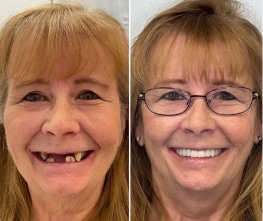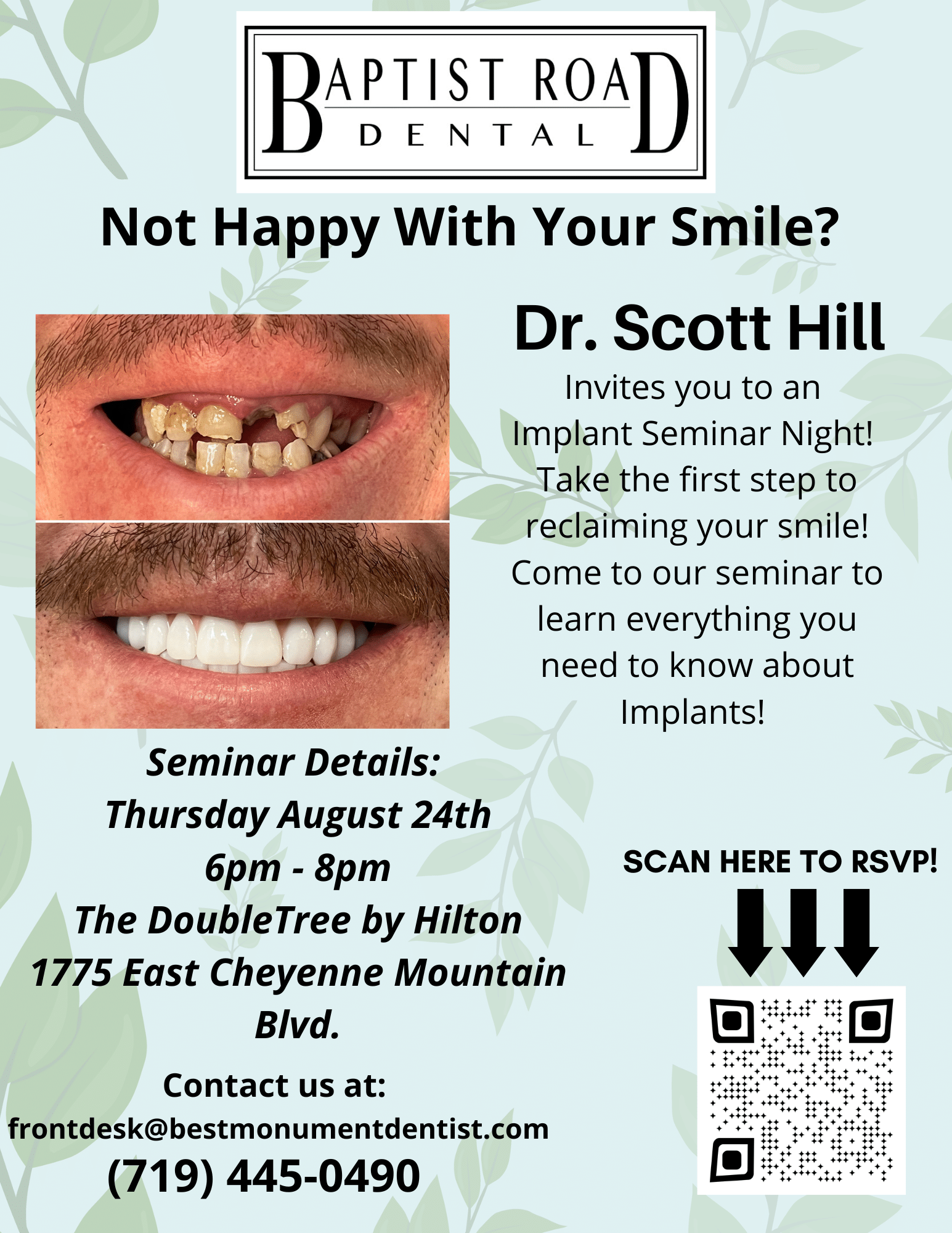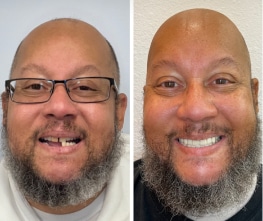Dental Implants in Monument, CO
Why Are Tooth Implants the Best Solution for Missing Teeth?
- Preserve facial structure, preventing the bone deterioration that occurs when teeth are missing.
- Allow patients to chew and speak normally, without irritation or discomfort.
- The prosthetic crown that replaces the tooth can be customized to mimic the color, texture, and contour of the natural teeth.
- Help to maintain healthy, adjacent teeth by alleviating the excess bite pressure placed on them.
Can Dental Implants Work for You?
Take this 15-second quiz to see if dental implants are right for you!
See how dental implants changed Michaels life
Real stories, real smiles, real results
See what our patients really have to say about their experiences at North End Dental in Colorado Springs, CO.
Phillip
Full Upper & Lowe Implants-Supported Permanent Dentures
Snap-In Dentures Testimonial
What Are Dental Implants?
Dental implants are a great way to replace missing teeth. They are small titanium posts that are surgically implanted into the jawbone. Once the implant posts are placed, a process called osseointegration occurs. Osseointegration is when the jaw bone and implant actually fuse together. When this happens, the implant post becomes very stable and allows the mounting of a prosthetic crown.
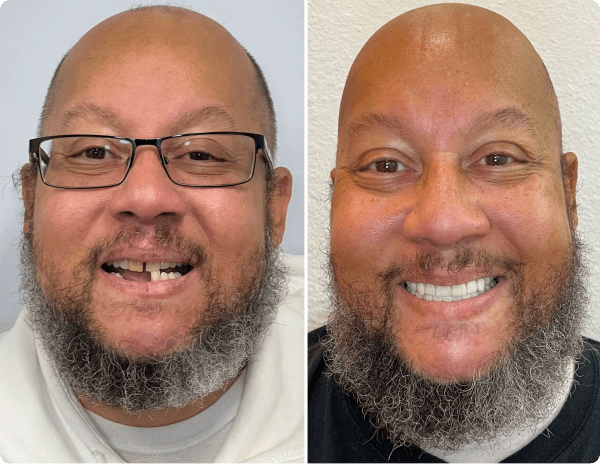
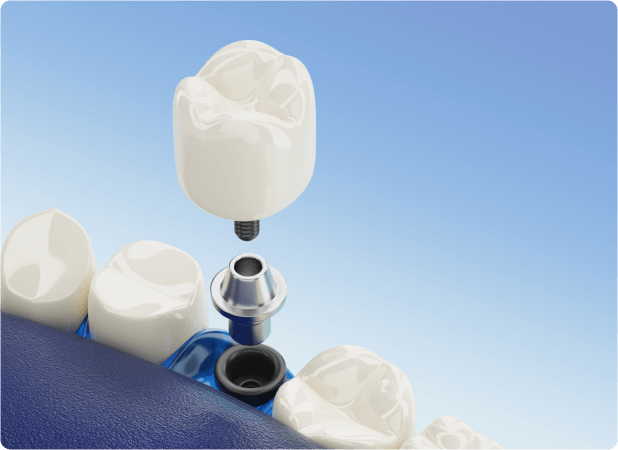
How Do Dental Implants Work?
During the initial diagnosis, we will scan the teeth digitally and create an impression, which will be used to fabricate the implant and crown. We will administer local anesthesia and numb the gums, teeth, and jawbone.
A small hole will be made in the jawbone, and the implant will be inserted into it. It will be held firmly in place using dental adhesives.
What Are the Advantages of Implant-Supported Dentures?
One of the biggest benefits of implant-supported dentures is their improved ability to eat. A traditional removable denture provides only 10% to 15% of normal chewing function. You can chew soft foods, but anything with crunch or texture like apples or steak should be avoided.
With implant-supported dentures, you will be able to eat a greater variety of foods. Also, the dentures would stay in place without getting dislodged, unlike traditional dentures.

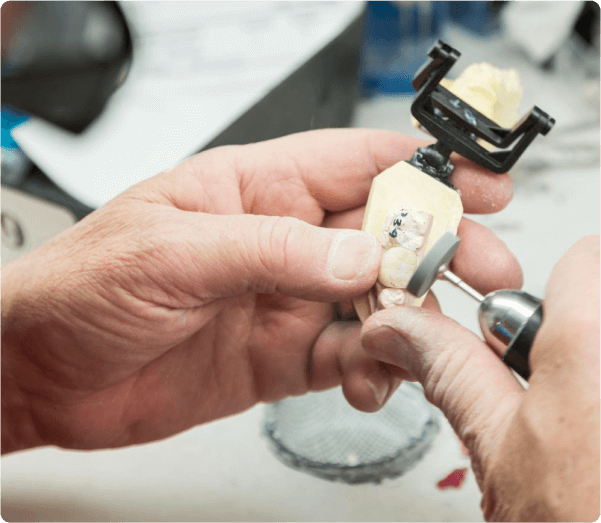
What Materials Are Used to Make Implant-Supported Dentures?
An implant-supported denture has two parts. The custom-made denture has an outer layer of acrylic or porcelain and an inner layer that looks like gum tissue. The dental implant, which is a screw made of titanium, is surgically placed in your jaw.
The dental implant acts as an anchor for the denture, snapping into place on the implant. The implant-supported denture is designed so that it will not shift or move when the patient speaks or eats.
Are Dental Implants the Right Option for You?
Dental implants are an excellent tooth replacement option for patients who live in good oral health. If you have tooth decay, gum disease, or other dental problems, these problems need to be addressed before you can receive dental implants. Our dentist will fully examine your teeth, gums, and mouth to look for any signs of dental problems. We will also take X-rays to see how healthy your jawbone is and to make sure it’s strong enough to support an implant.
If you’re a good candidate for dental implants, your dentist will discuss how the procedure works and what you can expect. Dental implants are permanent, so once they’re placed, you can care for them just like you would your natural teeth.
Request a Free Dental Implant Consultation Now!
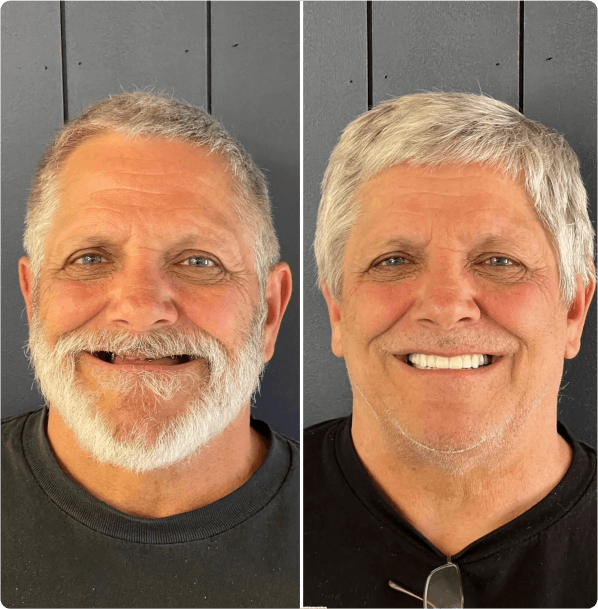
Download our Dental Implant Pricing & Information Guide
Fill out the form below and we will email/text you the guide along with $300 savings offer!
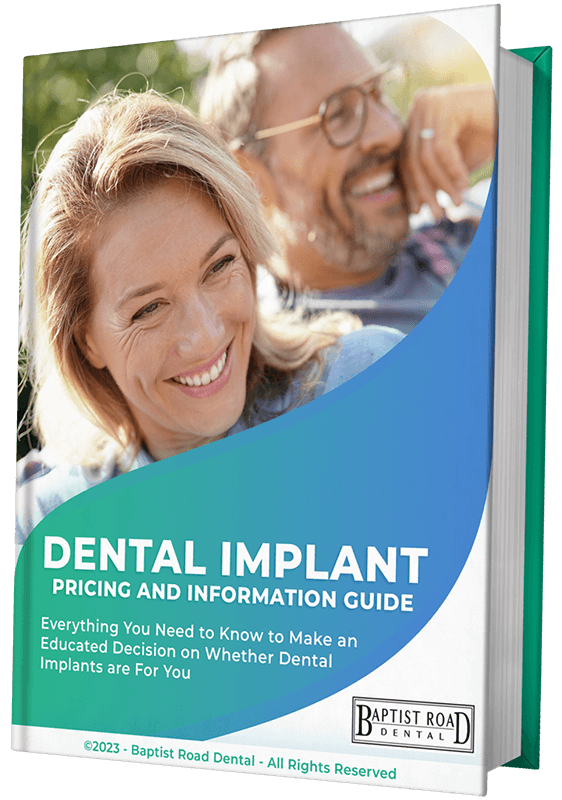
The Guide Will Show You
- Dental Implant Options
- Average Pricing
- Factors That Affect Eligibility
- And More!
Download our Dental Implant Pricing & Information Guide
Fill out the form below and we will email/text you the guide along with $300 savings offer!
Dental Implantation Procedure
- Dental implant procedures are usually performed over the course of a small handful of appointments.
- During the first appointment, we’ll make a small incision in the gum line. We’ll place the implant post into the socket and stitch the incision closed. We’ll give you temporary teeth to wear while the implant permanently fuses to the jawbone.
- Once your jawbone has fused to the implant post, we’ll place an abutment. The abutment holds your prosthetic tooth in place.
- We’ll remove the temporary teeth and install the permanent prosthesis.
Request a Free Dental Implant Consultation Now!
Why Choose Dental Implants Over Dentures?
Dental implants are the modern solution for replacing missing teeth. Traditional dentures only replace the visible portion of the tooth, but are simply held in place by suction, making them slightly unstable. On the other hand, dental implants replace the tooth root as well. This means your replacement tooth will be both functional and aesthetic. More importantly, implants are firmly secured to the jawbone, keeping them from slipping off.
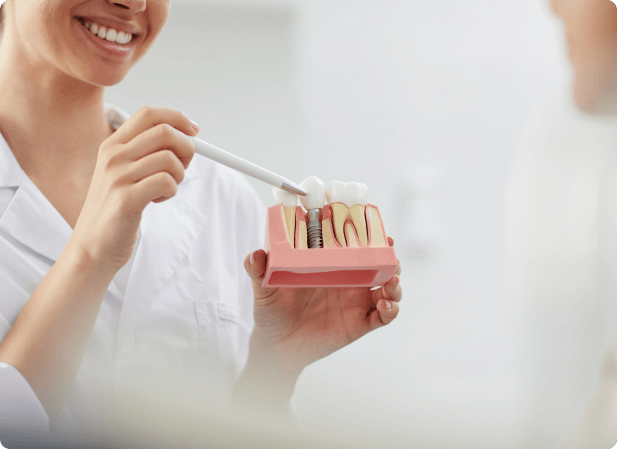
What Happens After the Implants Are Placed?
The implants need to bond to the jawbone through a process called osseointegration, which can take three to six months. In some cases, implants may be restored immediately after they are placed. The surgeon will advise you on follow-up care and timing. Once the bone firmly fuses to the implant, it will be stable enough for us to place a crown on it to replace the missing tooth.


Benefits of Full mouth rehabilitation
Although full mouth rehabilitation may take a considerable amount of time, its advantages are significant. Those who opt for this procedure can anticipate the following benefits:
- Restored oral health: The purpose of a complete mouth rehabilitation is to bring back all teeth to their functional state. This may involve extracting decay, repairing fractured teeth, and substituting any missing teeth. Upon completion of the procedure, patients will experience a significant enhancement in their oral well-being.
- Improved comfort: Oral health issues often cause patients to experience uncomfortable symptoms. A complete mouth rehabilitation aims to address these issues, enabling patients to improve their ability to bite and chew food, as well as increase overall comfort with their teeth.
- Restored confidence: A complete oral rehabilitation has the potential to boost a patient's self-esteem. The current state of their teeth can often make patients feel self-conscious about their smiles. However, a full mouth rehabilitation can effectively address this issue and bring about positive changes.
Who Would Need Full Mouth Rehabilitation?
Full mouth rehabilitation is an ideal solution to address multiple dental issues simultaneously. The absence of several teeth can lead to the displacement of the remaining teeth, resulting in bite problems like discomfort and difficulty while chewing.
Additionally, misaligned bites can cause speech difficulties. Opting for full mouth rehabilitation can effectively tackle all these issues and provide you with a beautiful, comfortable, and functional smile.

Full mouth rehabilitation treatments
A complete dental restoration involves a series of treatments that work together to improve the health and functionality of your mouth.
Individuals with persistent dental problems, such as:
- Tooth Decay
- Gum Recession
- Tooth Loss
- Bite Misalignment
- TMJ Disorder
To initiate the complete mouth reconstruction procedure, our dentist will first hold a consultation with you to address your oral health issues and objectives. Based on that, our dentist will suggest the necessary treatment plan. Apart from rectifying your dental health, a full mouth rehabilitation can also enhance the aesthetic appeal of your smile.

Full mouth rehabilitation Recovery
The duration of a full mouth rehabilitation may vary depending on the complexity of the procedures, and it could take several weeks or more to complete. It is expected that you may experience mild discomfort after each procedure.
It’s possible that you’ll receive a prescription for pain medication. In particular, patients who undergo multiple procedures may encounter swelling and soreness.

Smile Gallery
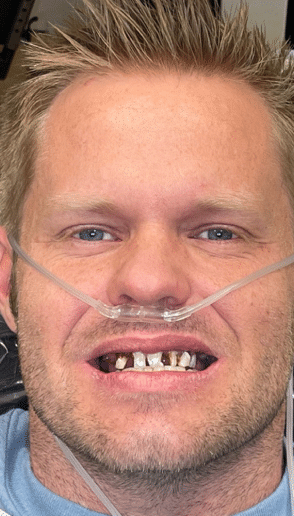









Dental Implants FAQ
What are dental implants?
Are dental implants a permanent solution?
What are the benefits of dental implants?
Is the dental implant procedure painful?
How long does the dental implant process take?
The dental implant process can vary depending on individual cases. It typically involves multiple stages, including a consultation, implant placement surgery, healing period, and final restoration placement. The total treatment time can range from a few months to several months, allowing for proper osseointegration (fusion of the implant with the jawbone) and healing. Our experienced dental professionals will assess your unique situation and provide a personalized treatment plan with a timeline specific to your needs.
Are dental implants suitable for everyone?
Dental implants are a suitable option for most individuals who have good oral health and sufficient jawbone density. However, certain conditions such as uncontrolled gum disease, systemic health issues, or inadequate bone structure may require additional treatment or make dental implants unsuitable. During your consultation at Advanced Dental & Implant Center, our dentists will evaluate your oral health and determine if dental implants are the right solution for you.
Can dental implants replace multiple missing teeth?
Yes, dental implants can be used to replace multiple missing teeth. Depending on the number and location of missing teeth, our dental team may recommend different implant-supported restorations, such as implant-supported bridges or implant-supported dentures. These options provide stability and functionality, allowing you to regain a complete and beautiful smile.
How do I care for my dental implants?
Caring for dental implants is similar to caring for natural teeth. Regular brushing, flossing, and routine dental visits are crucial to maintain the health of your implants and surrounding tissues. It is also essential to avoid habits such as smoking, as they can compromise the success of dental implants. Our dental team will provide you with detailed instructions on how to properly care for your dental implants to ensure their longevity.
Will my dental insurance cover the cost of dental implants?
Dental insurance coverage for dental implants can vary depending on your specific insurance plan. While some plans may provide coverage for a portion of the cost, others may have limitations or exclusions for implant-related procedures. Our knowledgeable team at Advanced Dental & Implant Center will work closely with you to understand your insurance benefits and maximize the coverage available to you. We can also discuss flexible financing options and payment plans to help you achieve your dental implant goals. Contact our clinic in Colorado Springs, CO, to learn more about insurance coverage and financial arrangements for dental implants.
Meet our Doctors
Let us help you maintain your perfect smile

Dr. Scott R. Hill
Dr. Scott Hill completed his bachelor’s degree at Utah State University and then received his Doctor of Dental Medicine (DMD) degree from the University of Kentucky College of Dentistry in 2014. After serving as an associate dentist in Ohio, he then selected Colorado Springs as the right location to settle his family.

Dr. Bridgette Young
Dr. Bridgette Young completed her Doctor of Dental Medicine (DMD) degree from Roseman University of Health Science, College of Dental Medicine in 2023. Prior to her doctorate, she completed a Bachelor of Science in Food Science and Human Nutrition at the University of Hawaii at Manoa.
What Our Patients Say
See what other patients are saying about us.
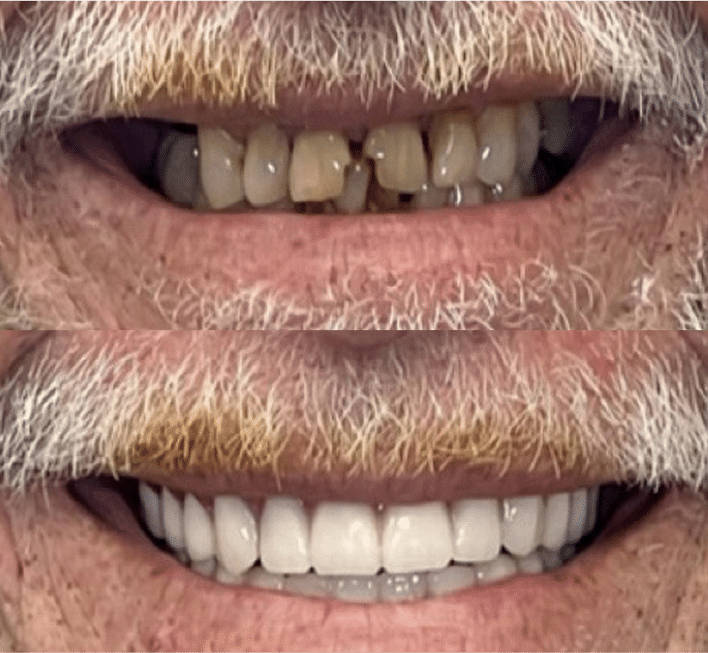
Smile Big Again: Transform Your Teeth with Dental Implants!
Experience the innovation and simplicity of dental implants! Get the freedom to smile, eat, speak, and enjoy your life again with top-of-the-line dental implants.
